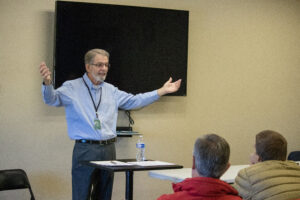
JACKSONVILLE, Fla. (BP)–It’s not very often that Hollywood positively portrays evangelical Christians, but such is the case in “Amazing Grace,” a major motion picture about William Wilberforce’s extraordinary leadership in the abolition of slavery. Celebrating the 200th anniversary of the slave trade’s demise in Great Britain, “Amazing Grace” opens in theaters this weekend nationwide.
Although the film is at times a bit vague about the extent and details of Wilberforce’s Christian faith, “Amazing Grace” is a movie every Christian should see — both because of its inspiring portrayal of the crusade to end the great moral evil of its day, and because of the relevance Wilberforce’s campaign for societal change teaches us about the great moral struggles of our day.
Rated PG for thematic material depicting the cruelty of slavery and some mild language, “Amazing Grace” is directed by Michael Apted and stars Ioan Gruffudd as Wilberforce, a man of tremendous historical import who is nevertheless largely unknown today.
It’s disappointing that Wilberforce’s conversion to Christianity was only fleetingly addressed in the movie in light of its extraordinarily pivotal role in his decision to lead the abolition movement.
Born into wealth and privilege, Wilberforce was elected to Parliament at the age of 21. After several years as an inconsequential member of Parliament (MP), Wilberforce took vacations in the winter of 1784-85 and the summer of 1785 with his former schoolmaster, Isaac Milner, who (to Wilberforce’s surprise) was a convinced evangelical. During their time together, Milner helped Wilberforce seriously consider the claims of the Gospel, ultimately resulting in what Wilberforce would later call his “Great Change.”
Wilberforce’s conversion was so profound and re-ordered his entire world that he agonized over whether he should leave politics and commit himself to a life of Christian ministry.
The struggle Wilberforce faced with abandoning politics for the ministry is a central theme of “Amazing Grace” and is best portrayed in a scene in which William Pitt (Benedict Cumberbatch) — a boyhood friend of Wilberforce who soon would become prime minister — arranges a meeting of anti-slavery activists with Wilberforce in order to convince him to stay in Parliament and lead the abolition cause.
Thomas Clarkson (Rufus Sewell), founder of the Committee for Abolition of the African Slave Trade, tells Wilberforce, “We understand you’re having problems choosing whether to do the work of God or the work of a political activist.” Hannah More (Georgie Glen), an activist for various humanitarian efforts, finishes Clarkson’s thought: “We humbly suggest that you can do both.”
According to Kevin Belmonte — author of “William Wilberforce: A Hero of Humanity” and historical consultant to “Amazing Grace” — in another meeting, Pitt sought to dissuade Wilberforce from leaving government, telling him, “Surely the principles as well as the practice of Christianity are simple, and lead not to meditation only but to action.”
In this meeting, as depicted in the film, Pitt tells Wilberforce the slave trade has “300 MPs in its pocket. It would be just you against them. But you could do it; you would do it.”
The other vital player in Wilberforce’s struggle over politics versus ministry was John Newton, a former slave ship captain who experienced a dramatic conversion to Christianity, resulting in his abandonment of the slave trade and a call to Gospel ministry. Newton, powerfully portrayed in the film by Albert Finney, is most well known as the author of the hymn, “Amazing Grace,” from which the film draws its name and inspiration. As a boy Wilberforce was exposed to Newton’s ministry but had lost touch with him until the parliamentarian sought a secret meeting with the evangelical pastor to seek his advice. Newton urged Wilberforce to remain in Parliament and fight for abolition.
On Oct. 28, 1787, Wilberforce wrote in his diary after his decisive meeting with Newton, “God Almighty has placed before me two great objects, the suppression of the slave trade and the reformation of manners [morals].” Indeed, from that point forward, Wilberforce gave the rest of his life to these two “great objects.”
Wilberforce became the abolition champion, first introducing a bill to end the slave trade in 1787. The economic power of the slave trade in the 18th century was enormous, and that influence extended to the halls of Parliament where Wilberforce was ridiculed and opposed at every turn for decades.
In spite of the hostility, Wilberforce tirelessly pricked the conscience of the nation about the horrors of slavery. At the end of his first speech to Parliament against the slave trade, Wilberforce told his colleagues, “Having heard all this you may choose to look the other way, but you can never again say you did not know.”
“Amazing Grace” effectively shows the opposition Wilberforce faced, as well as his determination to fight on, even in spite of his serious physical frailties.
In one scene, Wilberforce cleverly traps a sailing excursion of well-to-do citizens, causing their boat to be stopped in the bay next to the slave ship Madagascar, which had recently delivered 200 slaves to the West Indies, although it started with 600. Standing on the Madagascar, Wilberforce admonishes his audience offended by the foul stench to remove the handkerchiefs from their noses, saying: “That smell is the smell of death — slow, painful death. Breathe it in; breathe it deeply. … Remember that smell. Remember the Madagascar. Remember that God made men equal.”
The most poignant scene in Amazing Grace takes place late in the life of John Newton when Wilberforce has interrupted the former slave ship captain’s dictation of a tract exposing the atrocities of the slave trade. Recalling with profound remorse his involvement with slavery, Newton is haunted by the “20,000 ghosts,” people he helped enslave with “beautiful, African names. We called them with just grunts, noises. We were apes; they were humans!”
Newton tells Wilberforce, “I remember two things very clearly: I’m a great sinner and Christ is a great Savior.” Through tears the now sightless Newton declares, “I once was blind, but now I see,” quoting his famous hymn.
In 1807, 20 years after he first introduced the measure, the bill to end the slave trade in Great Britain was overwhelmingly adopted. It would take another 26 years to ban slavery altogether, and shortly before Wilberforce’s death he learned that a bill abolishing slavery in the empire would become law.
Wilberforce was not only concerned with ending slavery; he was also troubled by the immorality and coarseness so prevalent in Great Britain, dominated as it was by what he called “nominal” Christianity. This was the focus of the second “great object” of his life, the “reformation of manners” — morality. Toward that end, he wrote, “A Practical View of Christianity.”
In his helpful, short biography, “Amazing Grace in the Life of William Wilberforce,” John Piper says Wilberforce’s concern in publishing the book was to demonstrate that holding right doctrine would lead to right morality, but not the other way around. Wilberforce wrote, “The true Christian … knows therefore that this holiness is not to precede his reconciliation to God, and be its CAUSE; but to FOLLOW it, and be its EFFECT. That, in short, it is by FAITH IN CHRIST only that he is to be justified in the sight of God” (emphasis in the original).
This is the Gospel — that God’s grace is the cause of our salvation, and that our salvation results in “good works” (Ephesians 2:8-10) — beautifully depicted in Newton’s “Amazing Grace” hymn.
Sadly, Amazing Grace the film is weakest on this very point, failing to demonstrate the absolutely central role the Gospel itself was in Wilberforce’s motivations. That the movie would falter here should not be a surprise since it’s a secular production.
Still, the movie is inspirational and worthy of the patronage of Christians.
“Amazing Grace” will be especially meaningful to pastors. Ironically, while Wilberforce chose to remain in government rather than become a minister, the film is a reminder of the critical importance of ministers. Although the fruit of a pastor’s labor is sometimes hard to see, God providentially brings people into a minister’s care to impact their lives in sometimes unimaginable ways. Such was John Newton to William Wilberforce.
The film is also a moving testimony to the difference that can be made by one man fully committed to the mission God has given him, even against formidable odds. John Wesley wrote Wilberforce one week before the great Methodist evangelist died in 1791: “Unless God has raised you up for this very thing, you will be worn out by the opposition of men and devils. But if God be for you, who can be against you? Are all of them stronger than God?”
Christians should go and see “Amazing Grace,” and be inspired to be faithful disciples of Christ like William Wilberforce — and tell of God’s amazing grace.
–30–
James A. Smith Sr. is executive editor of the Florida Baptist Witness.















